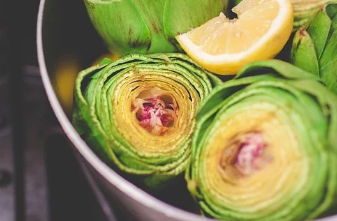By Sarah Beleski a recent ASU Nutrition Student

I’m going, to be honest… I had never even heard of artichokes until I was in high school. Fortunately, I have good old Applebee’s to thank for introducing me to the wonder that is spinach and artichoke dip. But that’s not all that artichokes are good for!
This highly underrated thistle, often confused as a vegetable, boasts many benefits! Artichokes are surprisingly very nutrient-rich. They are full of fiber, protein, vitamin C, vitamin K, thiamine, riboflavin, niacin, vitamin B6, folate, iron, magnesium, phosphorus, potassium, calcium, and zinc. One medium artichoke is approximately only 60 calories and includes 7 grams of fiber and 4 grams of protein. They also are low in fat and extremely rich in antioxidants.
An interesting point about artichokes is its potential to have beneficial effects on liver health. Many studies have been conducted that test artichoke leaf extract and its effects. Studies conducted with animals have shown that the extract has the potential to protect the liver and even possibly help the liver cells to regenerate. Another study involving 90 people with the non-alcoholic fatty liver disease showed similar results. The participants took 600 mg of artichoke extract every day for two months. The results of the study showed that the participants had improved liver function after the two months of artichoke consumption.
Artichokes may also improve digestive health. Its high fiber content helps everything in the digestive system to move smoothly. It also makes you feel full for a longer period of time, potentially eliminating overeating. One specific fiber that is found in artichokes is known as inulin and it works as a prebiotic. This prebiotic has been known to aid in improving gut bacteria. One study showed that 12 adults, who all consumed artichoke extract for three weeks, had an improvement in the bacteria of their gut at the end of the study.
According to the Journal of Clinical Biochemistry and Nutrition, artichokes may also have cancer-fighting elements. Artichokes contain flavonoid apigenin, which is a plant nutrient that may be able to help fight breast and pancreatic cancer cells.
Now, you might be trying to mentally calculate how much spinach and artichoke dip you would have to consume in order to reap these benefits, or maybe it’s just me, but unfortunately… that’s not the healthiest option. However, artichokes aren’t exclusive to spinach and artichoke dip (even if my high school self would have sworn it was true). There are many different ways that artichokes can be incorporated easily into your diet.
Here are some recipes to try out:
- Stuffed Artichokes
- Shrimp, Artichoke, and Fresh Ricotta Flatbread
- Braised Baby Artichokes
- Asparagus, Artichoke, and Mushroom Sauté with Tarragon Vinaigrette
- Orzo with Artichoke Pesto and Grilled Corn
- Chicken Piccata with Lemon, Capers and Artichoke Hearts
- Quick Artichoke Salad
- Spring Green Risotto with Artichokes
- Grilled Artichoke Sub
- Grilled Artichokes with Creamy Champagne Vinaigrette
Looking for fresh produce? Fill Your Plate has your back check our searchable database for farmers markets near you!
References
Brown, M.J. (2019) Top 8 Health Benefits of Artichokes and Artichoke Extract. healthline. Retrieved from https://www.healthline.com/nutrition/artichoke-benefits.
Miller, M. (2019) 10 Artichoke Health Benefits You Def Want to Get in On. Women’s Health. Retrieved from https://www.womenshealthmag.com/food/a25951695/artichoke- health-benefits/.
Salem, M.B., Affes, H., Ksouda, K., Dhouibi, R., Sahnoun, Z., Hammani, S., Zeghal, K.M. (2015) Pharmacological Studies of Artichoke Leaf Extract and Their Health Benefits. Plant Foods for Human Nutrition, 70, 441-453.

